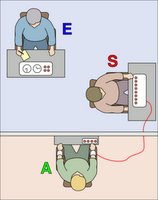This terrifying story was reported on ABC News Primetime: a caller to a McDonald's restaurant pretended to be a police officer investigating a theft and demanded an 18 year old employee to be strip searched and do outrageous things in front of the McDonald's managers.
The criminal who made the phone call was discovered in part because the investigators ran a Google search and found that the event was not isolated. Now the caller and the people who participated in the strip search are on the way to get long prison sentences but the real question is how this terrible thing was allowed to happen in the first place.
The story was linked on the technology web site Digg.com which uses the "wisdom of crowds" to promote stories to its front page. As one of the Digg.com readers pointed out, the strip search story is an example of a deviation in social psychology confirmed by infamous experiments in the past:

- In the Milgram experiment, the experimenter (E) persuades the participant (S) to give what the participant believes are painful electric shocks to another participant (A), who is actually an actor. Many participants continued to give shocks despite pleas for mercy from the actor (source: Wikipedia)
- In the Stanford Prison Experiment, students ended up acting the role of guards all too realistically
These psychology experiments show that "common sense is not so common" (Voltaire) but there is something more. We all know that it is difficult to confront authority but if the directions given just do not make sense, somebody has to stand out and do the right thing. Knowing that we, as humans, are prone to blindly follow orders, hopefully will make us more vigilant in the future and help us to avoid repeats of the strip search story and similar abuses.
The New York Times recently featured an article about the Archives of the History of American Psychology. The museum is in the basement of a former department store in Akron, Ohio and contain more than 1,000 bizarre instruments including the uniforms and billy clubs used in the 1971 Stanford Prison Experiment. The Archives building is just 45 minutes from the Rock and Roll Hall of Fame and Museum in Cleveland and two blocks from the Inventors Hall of Fame in Akron downtown.
Update 10/06/2007:
Jury: McDonald's should pay 6 millions for strip-search hoax. USA Today.
References:
Restaurant Shift Turns Into Nightmare - ABC News Primetime.
A hoax most cruel - The Courier-Journal.
Milgram experiment - Wikipedia.
Stanford prison experiment - Wikipedia.
New Modeling Gig - Dr. Helen.
Bizarre and Infamous Join Scholarship in an Archive of Psychology - NY Times.
Image source: Wikipedia, created by Wapcaplet in Inkscape
Stanford Prison Experiment Videos on YouTube. Scientific American.
5 Psychological Experiments That Expose Humanity's Dark Side. Alexandra Gedrose
The criminal who made the phone call was discovered in part because the investigators ran a Google search and found that the event was not isolated. Now the caller and the people who participated in the strip search are on the way to get long prison sentences but the real question is how this terrible thing was allowed to happen in the first place.
The story was linked on the technology web site Digg.com which uses the "wisdom of crowds" to promote stories to its front page. As one of the Digg.com readers pointed out, the strip search story is an example of a deviation in social psychology confirmed by infamous experiments in the past:

- In the Milgram experiment, the experimenter (E) persuades the participant (S) to give what the participant believes are painful electric shocks to another participant (A), who is actually an actor. Many participants continued to give shocks despite pleas for mercy from the actor (source: Wikipedia)
- In the Stanford Prison Experiment, students ended up acting the role of guards all too realistically
These psychology experiments show that "common sense is not so common" (Voltaire) but there is something more. We all know that it is difficult to confront authority but if the directions given just do not make sense, somebody has to stand out and do the right thing. Knowing that we, as humans, are prone to blindly follow orders, hopefully will make us more vigilant in the future and help us to avoid repeats of the strip search story and similar abuses.
The New York Times recently featured an article about the Archives of the History of American Psychology. The museum is in the basement of a former department store in Akron, Ohio and contain more than 1,000 bizarre instruments including the uniforms and billy clubs used in the 1971 Stanford Prison Experiment. The Archives building is just 45 minutes from the Rock and Roll Hall of Fame and Museum in Cleveland and two blocks from the Inventors Hall of Fame in Akron downtown.
Update 10/06/2007:
Jury: McDonald's should pay 6 millions for strip-search hoax. USA Today.
References:
Restaurant Shift Turns Into Nightmare - ABC News Primetime.
A hoax most cruel - The Courier-Journal.
Milgram experiment - Wikipedia.
Stanford prison experiment - Wikipedia.
New Modeling Gig - Dr. Helen.
Bizarre and Infamous Join Scholarship in an Archive of Psychology - NY Times.
Image source: Wikipedia, created by Wapcaplet in Inkscape
Stanford Prison Experiment Videos on YouTube. Scientific American.
5 Psychological Experiments That Expose Humanity's Dark Side. Alexandra Gedrose